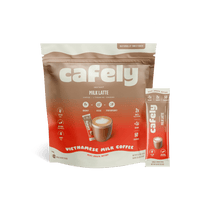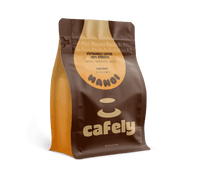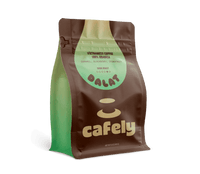Have you ever noticed that your pee smells like coffee? Many things can make your urine smell (from medication to health conditions or even certain foods), and coffee-scented urine is a perfectly natural response to drinking a cup of joe.
Let’s explore why coffee makes your pee smell, what you can do about it, and when it might be a sign of a more significant problem.
Why Does My Pee Smell Like Coffee?
When you drink coffee (or any other liquid), it first goes into your stomach. From there, it passes to the small intestine, where it is absorbed into your bloodstream and enters your circulatory system.
Urine is the liquid waste removed from your blood (and other circulatory fluid) and expelled from the body when you pee. The waste that’s extracted from your body (called metabolites) changes the composition and smell of your urine, so what you eat and drink can have a big impact on how your pee smells.
Coffee is a very aromatic beverage that gets its unique smell from polyphenols (5-hydroxymethyl-2-furoic acid, if you want to get technical) [1]. After being absorbed by the body, these polyphenols end up in urine and can make pee smell like coffee.
Coffee also contains high levels of caffeine, which affects your urine in other ways [2]:
- Caffeine makes you pee more (see more about this below), which can make your urine more concentrated.
- Caffeine easily passes to all parts of the body, including the brain, placenta, and even breast milk.
- 2-3% of caffeine from coffee is excreted unchanged in your urine.
Coffee-scented urine is generally harmless and will pass in a few days, but it might be a sign you are drinking too much coffee!
Understanding Dehydration & Urine Concentration

When you wake up in the morning, you might notice that your urine smells stronger than usual. The same often happens when you have been out in the sun, exercising, or not drinking enough water. This is because you are dehydrated.
Dehydration occurs when your body does not get enough fluids or when you lose more liquid than you take in.
The most common symptoms of dehydration in adults include the following:
- Extreme thirst
- Urinating and/or sweating less than usual
- Have dark or cloudy urine
- Experience dry skin
- Feel dizzy
Along with metabolites from your body, urine contains high levels of ammonia. When you are dehydrated, the stinky ammonia and metabolites in your urine are more concentrated, and your pee smells stronger.
The Diuretic Effects of Coffee
Caffeine is a mild diuretic, which means that it will make you pee more than usual. Thankfully, studies suggest that normal caffeine intake is unlikely to cause dehydration for several reasons:
- Caffeine is a mild diuretic and not strong enough to cause dehydration [3]
- Coffee contains plenty of water, and the increased urination is unlikely to offset this [3]
- The diuretic effects of coffee decrease with regular consumption, so the more you drink, the less it will make you pee [4]
While coffee is unlikely to make you dehydrated, the increased “need to go” will make your urine more concentrated, and it can have an even stronger coffee smell.
The best way to combat coffee-scented urine is to drink plenty of other fluids. With more fluids, your urine will be diluted and won’t smell as strong.
How much water you need is highly individualized, and experts are divided on the exact amount to drink each day. Harvard Medical School suggests drinking 4 to 6 glasses of water each day, while other sources say women need 11 glasses and men as much as 15 each day.
Consult your healthcare practitioner to determine just how much fluids your body needs to stay healthy.
Alternative Causes of Urine Odor
Coffee and dehydration aren’t the only things that can make your urine smell funny.
In fact, there are several causes, including:
Foods:
- Asparagus
- Fish
- Onions
- Garlic
- Honey
- Alcohol
- Fennel
- Dried fruit
- Brussel sprouts
(And let’s not forget the color-changing principles of beets!)
Medications:
- Certain B vitamins
- Antibiotics
- Some diabetic medications
- Chemotherapy
Medical conditions:
- UTIs
- Diabetes
- Bacterial vaginosis
- Yeast infections
- Kidney stones
- Pregnancy
- Maple syrup urine disease
How to Stop Your Urine from Smelling Like Coffee

If your smelly urine from your morning brew is bothering you, don’t worry. There are many ways to reduce the smell (without cutting out coffee from your daily routine.
Here are some effective ways to prevent your pee from smelling like coffee:
- Drink Less Coffee — Reduce your daily caffeine consumption, and do not exceed the recommended intake of 400 mg of coffee per day for adults and 200 mg per day for pregnant women [5].
- Drink More Water — Make sure you stay hydrated by drinking plenty of non-caffeinated fluids.
- Drink Lower Caffeine Beverages — Switch to low-caffeine alternatives, including decaffeinated coffee, black tea, or green tea.
- Brew Weaker Coffee — Dilute your coffee or choose a roast with less caffeine.
- Hold Off on Your Morning Brew — Wait 30 to 60 minutes after waking up before drinking coffee to give your body time to wake up and produce its natural cortisol.
When Smelly Urine is Fine (& When to See a Doctor)
If your smelly urine is caused by drinking coffee or eating other foods, it should go away within a few days without any trouble.
However, smelly urine might indicate a more serious health concern. Some scientists suggest that urine smell is a potential area for diagnosing diseases and other ailments [6].
Here are some situations when it is important to see your doctor:
- Your urine is excessively cloudy
- Urination is accompanied by pain or a burning sensation
- The smell persists even for longer than a few days
- The smell does not go away, or other symptoms develop
- Your pee smells for no obvious reason
- If your medication or medical condition is giving you cause for concern
While coffee-scented urine is not generally a health concern, strong-smelling urine might be a sign that you are drinking too much.
Symptoms of excessive caffeine consumption include:
- Restlessness
- Rapid heart beating
- Anxiety
- Headaches
- Agitation
- Nervousness or excitement
- Nausea
It is also possible, albeit rare, to overdose on caffeine, which has much more severe symptoms, including vomiting, hallucinations, chest pains, confusion, and convulsions.
If you experience any of the above symptoms, consult your healthcare practitioner immediately.
FAQs: Coffee Pee Smell
1: Is coffee-scented urine a sign of a medical condition?
While smelly urine caused by regular coffee consumption is usually harmless, persistent odor should be evaluated by a doctor. It is especially important to check with your healthcare provider if you experience other symptoms, such as cloudy urine, pain, or burning sensations while urinating. This might be a sign of an underlying issue.
2: How much coffee is too much?
The recommended daily intake of coffee is 400 mg or roughly four cups of brewed coffee. If you’re pregnant, keep it under 200 mg per day, and caffeine consumption is not recommended for children. Remember, everyone is different, so do not drink more coffee than your body can handle…even if it is less than the recommended daily intake.
Related: How Much Caffeine is In Different Kinds of Coffee?
3: Can other beverages cause urine odors?

Yes, several beverages like tea and alcohol (plus many foods) can affect your urine smell. Coffee, whether served hot or cold, will also have a similar effect on your urine odor (although cold brews do not cause as pungent pee as hot beverages).
4: Is there a quick fix to eliminate the coffee smell in urine?
The fastest ways to eliminate the coffee smell in your urine are to increase your water intake and reduce coffee consumption. By doing this, the coffee smell of your urine should go away fairly quickly.
If a pungent coffee odor persists, check with your doctor for underlying health issues.
5: Does dehydration affect urine odor?
Yes, dehydration plays a key role in urine odor. When dehydrated, your urine typically becomes more concentrated, making the ammonia in your pee more pungent. It can also make other odors more noticeable.
6: Are there health risks of drinking too much coffee?
Excessive caffeine intake can lead to restlessness, increased heart rate, and other symptoms. In very extreme cases, you can suffer from caffeine overdose.
Drinking large amounts of coffee over time can lead to some long-term side effects, like anxiety or stomach problems.
7: Can changing my diet help with urine odor?
Yes, there are many foods that cause your urine to smell, including asparagus, honey, onions, dried fruit, or fish (among others). Reducing or eliminating these foods can help improve urine odor.
8: Should I stop drinking coffee if my urine smells like it?
Not necessarily. On its own, coffee-smelling urine is perfectly natural and nothing to worry about. Instead, try reducing how much coffee you consume and drink plenty of other fluids throughout the day.
9: What are the signs of caffeine overdose?
Symptoms include vomiting, confusion, and hallucinations. While this condition is very rare, seek medical attention immediately if you or someone you know experiences any of these symptoms.
10: Can herbal teas help prevent coffee-scented urine?
Yes. Herbal teas are an excellent low-caffeine alternative to reduce coffee-scented urine. This is especially true with beverages that are naturally caffeine-free. Although many herbal teas contain caffeine and other urine-smelling compounds, they are unlikely to make your urine smell.
References
- Wagenstaller, M., & Buettner, A. (2013, August 7). Quantitative determination of common urinary odorants and their glucuronide conjugates in human urine. Metabolites.
- Chou, T. (1992, November). Wake up and smell the coffee. Caffeine, coffee, and the medical consequences. The Western Journal of Medicine.
- Herbert L. Muncie, Jr. (2007, November 1). The safety of caffeine consumption. American Family Physician.
- Robertson, D., Wade, D., Workman, R., Woosley, R. L., & Oates, J. A. (1981, April). Tolerance to the humoral and hemodynamic effects of caffeine in man. The Journal of Clinical Investigation.
- USDA. (2020). DIETARY GUIDELINES FOR AMERICANS NINTH EDITION.
- Wagenstaller, M., & Buettner, A. (2013a, August 7). Quantitative determination of common urinary odorants and their glucuronide conjugates in human urine. Metabolites.












